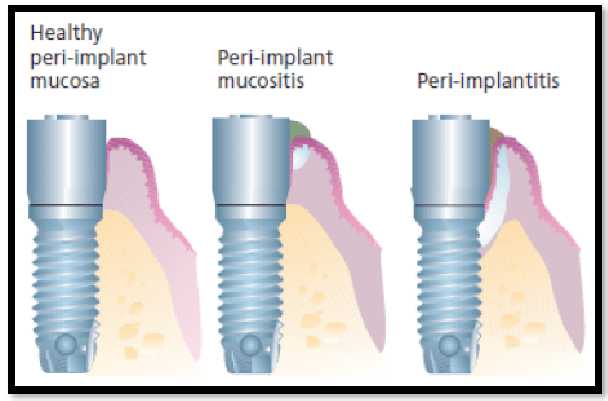Having implants doesn’t mean you can be careless about your oral hygiene. Hygiene is still essential to keep the tissues supporting the implants healthy. In the same way gingivitis or periodontitis affect your tissues when you still have your natural teeth, mucositis and peri-implantitis are the diseases we must take care of now.
Peri-implant mucositis
Mucositis is the reversible inflammatory process in the soft tissues surrounding the implant. At this stage, it’s possible to revert the process. However, if it worsens, we will finally suffer peri-implantitis. The process is similar to gingivitis evolving to periodontal disease.
Mucositis symptoms are:
- Edema through the tissues surrounding the implants.
- Reddening of the area.
- Bleeding.
- Hyperplasia of oral mucosa.
At first, mucositis symptoms are mild and usually painless. That’s why it’s convenient to pay attention during the check ups and visiting the specialist for control sessions.
Mucositis treatment consists of debriding/sterilizing the peri-implant sulcus, the surface and the top of the implant. This treatment will be combined with antibiotics or local antiseptics.


Peri-implantitis
Peri-implantititis is also an inflammatory process, though it does´t affect just to soft tissues, but also to the bone supporting the dental implant. Usually, peri-implantitis appears when mucositis worsens, though there are other causes too.
Peri-implantitis symptoms:
- Inflammation of the mucosa and the tissues surrounding the implant.
- Enrojecimiento de la zona.
- Reddening.
- Pain and mobility of the implant.
- Drilling over 6 mm
- Bone loss.
Periodontal disease treatment depends on the stage of the disease. The target is stopping the bone loss so it goes on functioning as the support along with the healthy periodontal tissues and lost tissues regeneration whenever is possible.
Usually, this treatment consists of cleaning all the bacteria surrounding the implant. That’s how the infection disappears and the surface of the implant smooths, removing the plaque. Subgingival debridement, manual or chemical, is combined with antibiotics. Bone grafting may also be performed to regenerate the lost bone.
Peri-implant disease causes
Preventing the causes for peri-implantitis is essential:
- Right dental hygiene, cleaning deeply the gaps between teeth and the joints between the gum and the crown, where the plaque adheres first. Implants do nos suffer tooth decay, but plaque accumulates, and causes gum disease and halitosis.
- Another cause for peri-implantitis is occlusal overload due to a poor design of the prosthesis besides not paying attention to the bite in later check ups. This poor design complicates a right hygiene provoking gum disease.
- Malpositioning dental implants.
- Periodontal disease previous to implants placement. Some systemic diseases, smoking, alcohol abuse and a nutrient poor diet are factors contributing to peri-implantitis.
It’s really important not to miss the clinic check ups after dental implant treatments, do not forget it.
In Artedental, in Puerto de la Cruz, we are specialised on dental implants and count on our own laboratory to fit your specific necessities. Ask for an appointment, the visit and the budget are free.
Image sources: Pinterest.

